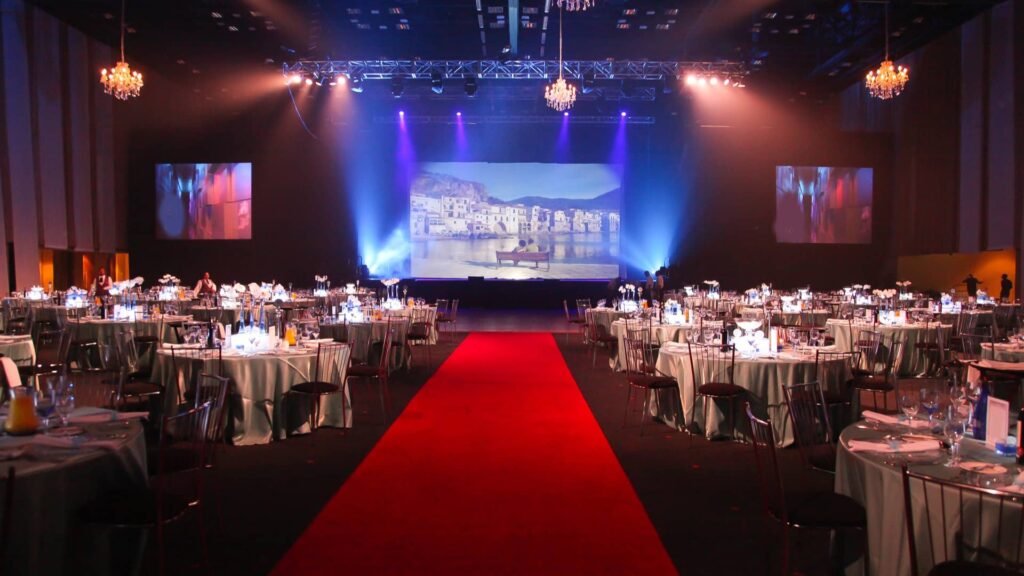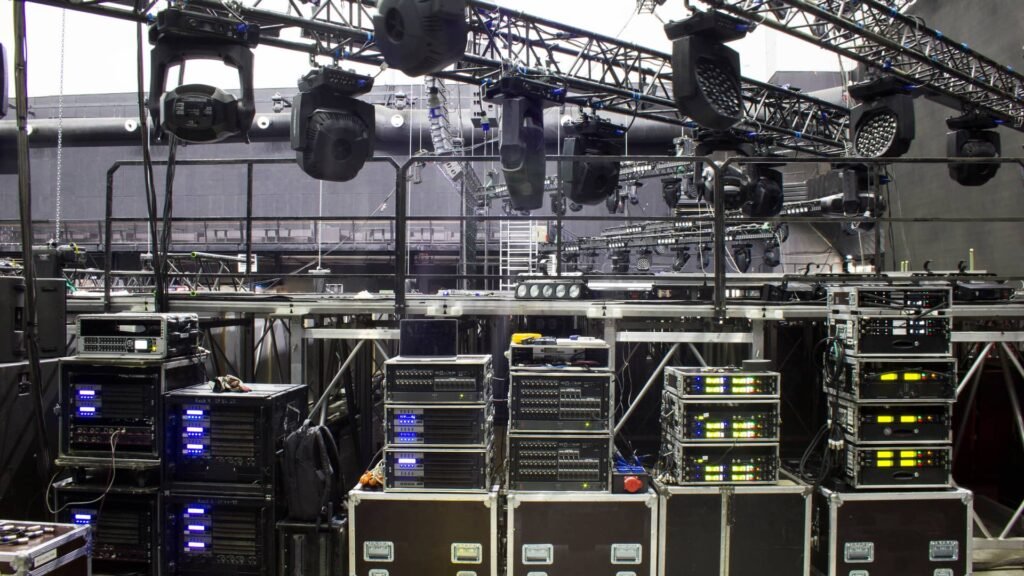Planning a concert is much more than just concert stage rental and promotions. Beneath the electric energy of a concert’s encore-worthy performance lies an intricately choreographed masterpiece of planning and execution. Picture the atmosphere charged with anticipation, fans converging beneath the vibrant glow of stage lights, their pulses synchronized with the impending rhythm. Facilitating this harmonious blend of music and emotion requires more than mere talent; it demands the meticulous coordination of every detail, each element a crucial note in crafting an unforgettable evening.
Beginning with securing a cutting-edge concert stage rental, every aspect contributes to the symphony of a memorable night. From the precision of acoustic engineering, ensuring every lyric resonates through the captivated crowd, to the strategic play of lighting accentuating every artist’s movement, the success of a concert is sculpted long before the curtains part. The crescendo of a triumphant concert emerges from the collaboration, expertise, and unwavering pursuit of excellence. In this performance, the music and the collective endeavor earn a resounding ovation.
A concert transcends mere entertainment; it becomes an immersive experience—an amalgamation of melody, artistry, and fervor that etches itself into the hearts of its audience. And behind the scenes of every unforgettable spectacle stands a dedicated team of professionals, tirelessly working to bring the vision to life.
Define Your Goals
Defining your goals is the cornerstone of planning any successful concert. It’s the compass that guides every decision and shapes the overall direction of your event. Start by clearly articulating the purpose behind your concert. Are you aiming to raise funds for a charitable cause, amplify awareness for an important issue, spotlight emerging talent, or commemorate a special occasion?

Understanding the underlying objective not only informs the tone and theme of the event but also influences crucial aspects such as venue selection, artist lineup, marketing strategy, and ticket pricing. By establishing concrete goals from the outset, you lay a solid foundation that streamlines the planning process and ensures that every element of your concert aligns harmoniously with your overarching vision.
Live concert and festival event production

Set a Budget
Setting a budget is a critical step in the concert planning process, serving as the financial roadmap that keeps your event on track and within manageable limits. Begin by comprehensively assessing all anticipated expenses associated with hosting the concert. This entails considering various factors such as venue rental fees, performer fees and accommodations, equipment rentals or purchases, marketing and promotional costs, staffing wages, insurance, permits, and any additional miscellaneous expenses that may arise.
Once you’ve itemized your projected expenses, it’s essential to establish a realistic budget that aligns with the available resources and financial constraints. Be thorough in your estimation, factoring in fixed costs and potential contingencies to ensure that you prepare for any unforeseen expenses that may arise during the planning process. Moreover, consider allocating funds strategically based on priority areas, giving precedence to elements that directly impact the overall quality and success of the concert. By setting clear budgetary boundaries and adhering to financial discipline, you can mitigate the risk of overspending and optimize resource allocation to maximize the impact of your event within the specified financial parameters.
Choose a Venue
Choosing the right venue is paramount to the success of your concert, as it sets the stage for the entire event experience. Start by assessing your target audience’s specific needs and preferences, taking into account factors such as the anticipated crowd size, demographic profile, and the overall ambiance you wish to create. Consider the logistical requirements of your concert, including parking availability, public transportation access, and proximity to amenities such as hotels and restaurants for attendees’ convenience.

Next, evaluate potential venues based on their capacity to comfortably accommodate your expected audience size. Ensure that the venue’s layout and acoustics are conducive to an optimal listening experience, with clear sightlines and quality sound projection throughout the space. Additionally, consider the venue’s flexibility in terms of setup options, allowing you to configure the space to suit your specific staging and production requirements.

Book Performers
Booking performers is a pivotal aspect of concert planning, as they are the heart and soul of the event, captivating audiences with their talent and energy. Begin by researching and identifying artists or bands whose musical style and genre resonate with your target audience and complement the overall theme and atmosphere of the concert. Consider factors such as the artists’ popularity, stage presence, and reputation for delivering captivating live performances.
Once you’ve curated a list of potential performers, initiate contact to discuss their availability and interest in participating in your event. Negotiate performance contracts that outline essential details such as performance times, duration, compensation, and any specific technical requirements or accommodations they may need. Be transparent about your budget constraints and negotiate mutually beneficial terms for both parties.
Promote the Event
Promoting your concert is a multifaceted endeavor that creates buzz and generates anticipation among potential attendees. Craft a comprehensive marketing plan that leverages a variety of channels to ensure maximum visibility for your event. Social media is a powerful tool in today’s digital age, so create engaging content across platforms like Facebook, Instagram, Twitter, and even TikTok. Utilize these platforms for event announcements and share behind-the-scenes glimpses, artist spotlights, and interactive content that encourages audience engagement.

Incorporate email newsletters to reach a targeted audience directly. Develop visually appealing and informative newsletters highlighting critical details about the concert, including the lineup, venue information, ticket prices, and any special promotions or early-bird offers. Encourage recipients to share the newsletter, extending your reach organically.
Don’t overlook traditional marketing methods. Distribute eye-catching posters and flyers in strategic locations where your target audience will likely gather. Work with local media outlets to issue press releases, garnering coverage that reaches a broader audience. Online event listings on dedicated platforms and community websites can significantly boost visibility.

Sell Tickets or RSVPs
Selling tickets or managing RSVPs is a critical aspect of concert planning that requires careful consideration and strategic decision-making. Begin by selecting the most suitable ticketing or RSVP platform that aligns with your event’s needs and your target audience’s preferences. Online ticketing platforms offer convenience and accessibility, allowing attendees to purchase tickets from the comfort of their homes or on the go. Choose a platform with user-friendly interfaces and robust features for managing ticket sales, issuing refunds, and generating attendance reports.
Define your ticket pricing structure based on the event’s production costs, anticipated attendance, and perceived value. Consider offering early bird discounts or tiered pricing to incentivize early ticket purchases and create a sense of urgency among potential attendees. Explore the possibility of implementing VIP packages that provide additional perks and exclusive access to enhance the concert experience for premium ticket holders.
Manage Logistics
Managing logistics is a multifaceted process that requires careful planning and coordination to ensure the smooth execution of your concert event. Begin by assessing the logistical requirements specific to your venue and event size, considering factors such as transportation accessibility, parking availability, and local regulations.

Arrange transportation options for attendees, providing clear directions and information on public transit routes, rideshare services, and parking facilities. Consider implementing shuttle services or designated drop-off zones to facilitate easy access to the venue, especially for guests arriving from out of town or those without personal transportation.
Parking Logistics
Address parking logistics by identifying suitable parking areas near the venue and coordinating with local authorities or parking management companies to secure adequate parking spaces for attendees. Implement efficient traffic flow patterns and signage to guide drivers to available parking spots and minimize congestion around the venue area.
Security And Medical
Prioritize security measures to ensure the safety and well-being of concert attendees, staff, and performers. Hire trained security personnel to monitor entrances, patrol the venue grounds, and promptly respond to any security incidents or emergencies. Implement crowd control measures to manage large crowds effectively and prevent overcrowding in high-traffic areas.
Arrange for emergency medical services and first aid stations onsite to address any medical emergencies or health-related issues that may arise during the event. Ensure that medical personnel are adequately trained and equipped to provide timely assistance and administer necessary treatments as required.
Communications
Communicate logistics information and emergency procedures to all stakeholders, including staff, volunteers, vendors, and attendees, through clear signage, announcements, and informational materials. Establish contingency plans and emergency protocols to address unforeseen circumstances or disruptions and mitigate potential risks to the safety and security of participants.
Regularly monitor and evaluate logistical operations throughout the event, making adjustments and addressing any issues or challenges that may arise promptly. Maintain open lines of communication with relevant stakeholders and agencies to facilitate seamless coordination and collaboration in managing event logistics.

Execute the Event
Executing the event is the culmination of meticulous planning and preparation, where all the moving parts come together to create a memorable experience for attendees. On the day of the concert, the focus shifts to seamless execution, ensuring that every aspect of the event runs smoothly and according to plan.
Begin by overseeing the setup of the venue, including concert stage rental assembly, sound and lighting setup, seating arrangements, and any other logistical requirements. Coordinate with the production team, technical staff, and performers to ensure that all equipment is in place and functioning correctly.
Facilitate performer coordination, ensuring that artists are briefed on performance schedules, soundcheck times, and any specific technical requirements. Maintain open communication channels with performers and their management teams to address any last-minute changes or concerns.
Manage audience entry and seating, implementing efficient ticketing or RSVP procedures to streamline check-in and minimize wait times. Provide clear guidance and assistance to attendees to help them navigate the venue and locate their seats or designated areas.
Conclusion: Concert Stage Rental And A Successful Show
Adhering to these comprehensive steps lays the groundwork for planning and executing a successful concert that captivates your audience while effectively achieving your event objectives. From concert stage rental to managing logistics and executing the event itself, each stage of the process plays a pivotal role in ensuring a seamless and memorable experience for all involved.








